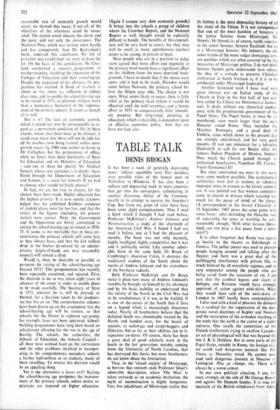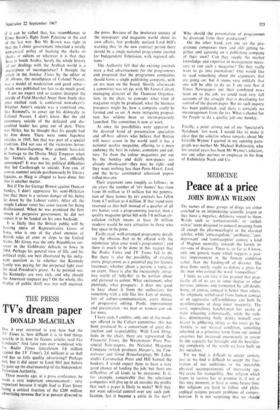TABLE TALK
DENIS BROGAN
It has been a week of generally depressing news: tedious squabbles over Test matches, over possible visits of the honest men of Yorkshire to Rhodesia. It has also been a tedious and depressing week in most countries that get into the newspapers, culminating in another disastrous defeat of the Common- wealth in its attempt to recover the America's Cup. But from my point of view there have been some slight compensations. Thus I read a book which I thought I had read before, Professor McKitrick's Andrew Johnson and Reconstruction, a study of the aftermath of the American Civil War. I found I had not read it before, and so I had the pleasure of novelty. The book was not only masterly, highly intelligent, highly competitive, but it was and is politically useful. Like another admir- able book in the same field, Dr Brock of Cambridge's American Crisis, it destroys the traditional wisdom of the South about the merits of Andrew Johnson and the wickedness of the Northern radicals.
Both Professor McKitrick and Dr Brock make it plain how many of Andrew Johnson's troubles he brought on himself by his obstinacy and by his basic inability to understand that the victory of the North in the Civil War had to be revolutionary if it was to be fruitful. It is one of the curses of the South that it lives on a legend which is increasingly disastrous today. Nearly all Southerners believe that the defeated South was abominably treated by the North and handed over, for the basest of reasons, to scalawags and carpet-baggers and illiterates, but as far as their abilities ran to it, rapacious ex-slaves. Of course, there has been a great deal of good scholarly work in the South in the last generation, notably coming from the University of North Carolina, that has destroyed this thesis; but most Southerners do not know about the destruction.
Thus, in the 'closed society' of Mississippi, to borrow that eminent exile Professor Silver's admirable description, where 'Ole Miss' is taken seriously as an academic institution, the myth of reconstruction is highly dangerous. Very few inhabitants of Mississippi realise that
its history is the most depressing history of all the states of the Union. It is not unimportant that one of the most hawkish of Senators is the junior Senator from Mississippi, Mr Stennis. Mr Stennis is, of course, vastly superior to the senior Senator, Senator Eastland; but he is a Mississippi Senator. His industry, the ab- sence in him of the more vulgar demagogic arts, are qualities which are often covered up by the necessities of Mississippi politics. I do not think Senator Stennis quite understands how odious the idea of a crusade to preserve Christian civilisation in South Vietnam is, if it is to be conducted under Mississippi leadership.
Another historical work I have read with great interest was an Italian study of the Church in Italy in the first half of last cen- tury called La Chiesa tra Metternich e Lamer,- nals. It dealt, without any rhetorical exuber- ance, with the preposterous government of the Papal States. The Papal States, it must be re- membered, were much larger than the agro Romano round Rome. They included the Marches, Romagna, and a good deal of Umbria, areas which down to the present day are strongly anti-clerical, and for very good reasons. (It was not unnatural for a left-wing blacksmith to call his son Benito after the famous Indian President of Mexico, Juarez.) How much the Church gained through its unthanked benefactors, Napoleon Ill, Cavour, Victor Emmanuel II!
But what entertained me most in this work were some modern parallels. The ecclesiastical authorities were just as zealous in rebuking improper dress in women as the Greek colonels are. It was pointed out that women sometimes came to church in dresses which revealed too much for the peace of mind of the clergy. (A correspondent in the Jewish Chronicle of 15 September 1967 poses the same point with some force: after defending the Halachic rule of separating the sexes at worship, he ask,, reasonably enough, 'With what kavana [devo- tion] can one pray a few paces from a mini- skirt?') It is often forgotten that Rome was nearly as hostile to the theatre as Edinburgh or Geneva. The police power was used to prevent people hanging around and talking after the theatre; and there was a great deal of the pettifogging interference with private life, so much beloved by all moralistic regimes, and so very unpopular among the people who are being saved from the occasions of sin. I am sure that the cardinal legates and vicars in Bologna and Ravenna would have strongly approved of action against mini-skirts. What they would have said of the mini-skirts of London in 1967 hardly bears contemplation.
I also read with a kind of pleasure the demand by a cardinal for the suppression of the dan- gerous novel doctrines of Kepler and Newton and the restoration of the orthodox teaching of the truth that the earth is the centre of a stable universe. One recalls the contortions of the French intellectuals trying to swallow Lysenko, an act of physiological will that was beyond the late J. B. S. Haldane. But in some parts of the Papal States, notably in Rome, the foreign visi- tor could read dangerous journals like The Times, as Macaulay noted. He cannot now read such dangerous journals in Moscow or Leningrad. Plus ca change, etc. There will always be a worse censor.
In our own political situation, I am, for once, strongly on the side of Mr George Brown and against Mr Duncan Sandys. It is true the spectacle of the British withdrawal from Aden. if it can be called that, has resemblances to Ernie Bevin's flight from Palestine at the end of the last war. But Mr Brown was right in that the Labour government inherited a totally nonsensical policy of backing the sheiks or shaiks or sultans or whatever it is that they have in South Arabia. Surely the whole history of our dealings with the Arabian world is a masterpiece of incompetence? I thought the article in the Sunday Times by the editor of Al Ahram, the mouthpiece of Colonel Nasser, was a model of moderation and good sense— which was published too late to do much good. I am no expert and so cannot interpret the suicide of Field-Marshal Amer (how freely that once exalted rank is conferred nowadays!). Whether Amer's suicide was a contrived one, like Rommel's, to cover up his disloyalty to Colonel Nasser, I don't know. But the old customary suicide of the defeated and dis- credited leader has gone out of date. There was Hitler, but he thought that his people had let him down. There were some Japanese suicides in 1945, but that was part of a special tradition. Did not one of the victorious heroes of the Russo-Japanese War commit hara-kiri in homage to the Divine Meiji Emperor when the Tenno's death was, at last, officially announced? It was not his political difficulties that led Castlereagh to suicide. You can, of course, commit suicide posthumously by literary legacies, as Haig is alleged to have.done, but that is another matter.
But if I'm for George Brown against Duncan Sandys, I don't appreciate his semi-Hitlerian line that there is a serious danger of his being let down by the Labour voters. After all, the simple Labour voter has some reason for being disillusioned. When he was promised the firm smack of purposive government, he did not expect it to be landed on his own backside.
It is likely that the British public will be hearing more of Representative Gross of Iowa, who is one of the chief enemies of British sales of arms or ships to the United States. Mr Gross was the only Republican sur- vivor in the Goldwater debacle in Iowa in 1964. Perhaps his general view of life, and his political style, are best illustrated by his indig- nant question as to whether the Kennedy family was paying for the perpetual light over the dead President's grave. As he pointed out, the Kennedys are very rich, and why should the American taxpayer pay? On the whole, this display of public thrift was not well received.



































 Previous page
Previous page